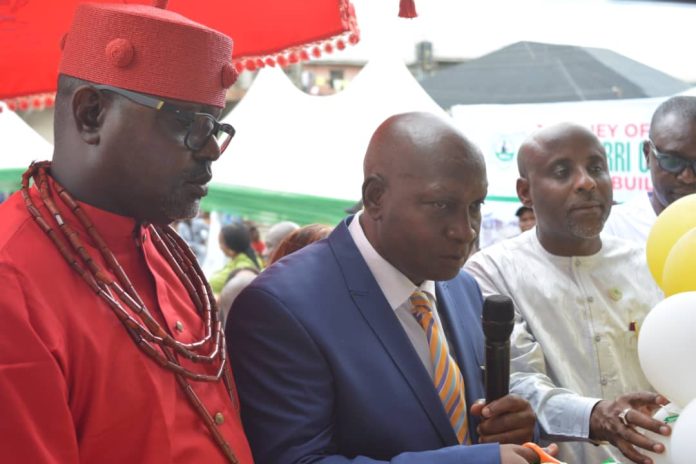IN Nigeria, as in many parts of the world, journalism is not just a profession; it is a calling rooted in the pursuit of truth, justice, and public good.
But the practice of journalism in Nigeria is not for the fainthearted. Beneath the headlines and camera flashes lies a bitter truth: too many Nigerian journalists operate in a climate of fear, deprivation, and suppression.
In this reality, any deliberate investment in uplifting the media is not just commendable, it is revolutionary. And that is exactly what played out recently in Delta State when Governor Sheriff Oborevwori reaffirmed his administration’s commitment to the press during the inauguration of the newly-built Press Centre in Warri.
Speaking during the inauguration of the Chief Government Ekpemupolo Press Centre at the Warri Correspondents’ Chapel Press Week and NUJ Lecture/Award Ceremony, Governor Oborevwori, represented by the Executive Director of Projects at Delta State Oil Producing Areas Development Commission (DESOPADEC), Dr Ebenezer Okorodudu, reaffirmed his administration’s commitment to fostering stronger ties with the media. He praised the press for its invaluable role in promoting transparency and accountability in governance, referring to the media as the “fourth estate of the realm.” The Governor also commended the newly completed Press Centre as a “landmark achievement for press freedom and professionalism,” a rare feat, he noted, not yet replicated anywhere else in Nigeria.
Oborevwori further lauded Tantita Security Services, chaired by Chief Government Ekpemupolo, for their vital support in building the facility and promoting broader community development goals. The Press Centre, he emphasised, is more than just bricks and mortar; it is a symbol of how the government and media can work together for democratic progress.
In his remarks, the Chairman of the Warri Correspondents’ Chapel, Comrade Okies Okpomor, echoed the appreciation, crediting Governor Oborevwori for enabling the completion of the project. “If not for him,” he said, “this ceremony wouldn’t have taken place here.”
Looking beyond the present, Okpomor announced ambitious plans to build a ₦4 billion journalist village along the Warri-Sapele Road. The proposed estate will consist of 50 housing units, a police post, a mini market, and a school, offering safety, stability, and dignity to media practitioners. He appealed to the Delta State Government, Tantita, corporate bodies, and federal legislators to help turn this vision into reality. The event was attended by notable dignitaries, including the Oroseun of Okere-Urhobo Kingdom, HRM Dr Ogheneochuko Egbobonyen; the Ovie of Idjerhe Kingdom, HRM King Monday Whiskey Odurhie; NUJ National President, Comrade Alhassan Yahya; Delta NUJ Chairman, Comrade Churchill Oyowe; and National NUJ Leader, Comrade Asiwaju Sola Adebayo, among others.
While the celebrations in Warri were well-deserved, they also served as a contrast to the broader reality faced by journalists across Nigeria. Many work without pay, or receive a stipend so meagre it cannot cover basic needs. Some are forced to fund their assignments, and exposed to harm without insurance or hazard pay. In the end, the same people tasked with shining a light on injustice are themselves victims of systemic neglect.
The media space is further complicated by what many now call the “padded press syndrome”, a practice where journalists are systematically excluded from live access to events and spoon-fed carefully-worded press releases.
The relationship between journalists and governments in Nigeria is occasionally uneasy, marked by suspicion, conditional support, and at times, outright hostility. When media narratives align with interests, journalists are courted and celebrated.
When they challenge official policies or expose corruption, they are branded enemies of progress. Such a reality was recently spotlighted in various press freedom reports, including one by Reporters Without Borders, which consistently ranks Nigeria low on the World Press Freedom Index, citing violence against reporters and arbitrary detentions. If Nigeria is to preserve its democratic values, stakeholders must rally to protect the integrity of journalism.
This begins with tangible support, fair wages, access to resources, legal protections, and safe working conditions. It requires both government and private media owners to treat journalism as a cornerstone of national development, not as a disposable asset. Civil society, advocacy groups, and international watchdogs must also continue to speak up for press freedom. Media literacy should be promoted, and legal safeguards must be strengthened to ensure that journalists can do their work without fear. Against this backdrop, Delta State’s actions stand out, not just in symbolism but in substance. In building infrastructure, supporting journalist welfare, and affirming the media’s role in governance, Governor Oborevwori is setting a national precedent. He is not attempting to control the narrative but rather to strengthen the bridge between the government and the people. His government recognises that a well-supported, independent press is essential for development, peace, and prosperity.
The Chief Government Ekpemupolo Press Centre is more than just a structure; it is a message. It says: journalists matter. Their safety matters. Their voice matters. Still, the responsibility does not lie with Delta alone. Other state governments, media owners, non-profits, and corporate institutions must also rise to the occasion. Journalists need better pay, safer working environments, and institutional respect. They need more press centres, housing plans, and legal protections.
As a nation, we cannot expect the media to remain the watchdog of democracy while muzzling, starving, or intimidating it. That is hypocrisy, not democracy.
It is time to stop asking journalists to “manage” while they deliver the nation’s conscience. In the end, a society is only as informed as the journalists it allows to speak freely.
As the Warri Press Centre opens its doors to a new era of professionalism and pride, it must also remind us of what is at stake. The journalist is not the enemy. The truth is not treason. And the pen, though worn, must never be broken.


